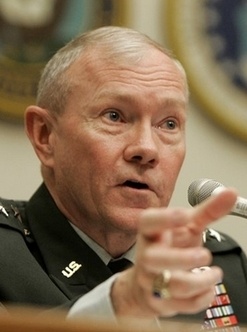Dempsey to become US Central Command chief
Updated: 2008-03-28 16:10
WASHINGTON -- One of the Army's most Iraq-savvy generals is taking charge, at least temporarily, of arguably the most important command in the US military, with responsibility for the wars in Iraq and Afghanistan.
In a ceremony Friday at MacDill Air Force Base, Fla., Lt. Gen. Martin Dempsey is to assume command of US Central Command from Navy Adm. William J. Fallon, who announced unexpectedly on March 11 that he was quitting. Fallon cited press reports that he was at odds with President Bush over Iran policy.
|
|
Defense Secretary Robert Gates, who has denied that Fallon was out of step on Iran, and Navy Adm. Michael Mullen, chairman of the Joint Chiefs of Staff, are scheduled to attend the ceremony.
Dempsey, whose field experience in the early stages of his 34-year Army career was largely in Europe, has been deputy commander at Central Command since August 2007. He will serve as the acting commander until Bush chooses a permanent replacement and gets that person confirmed by the Senate.
Fallon was the first Navy officer to head Central Command since it was created in 1983. It typically has been commanded by an Army general -- John Abizaid prior to Fallon, and Tommy Franks before Abizaid.
Dempsey takes charge at a particularly sensitive time, not only because of heightened concern about relations with Iran and the uncertain outlook for the wars in Iraq and Afghanistan, but also because of the approach of the November elections and the prospect of policy shifts by a new president.
One of Fallon's final acts was to advise Bush and Gates on how to proceed in Iraq after July, when the last of the troop reinforcements that Bush ordered in 2007 are to have returned home. At points during his 13 months in charge at Central Command, Fallon was perceived as being at odds with Army Gen. David Petraeus, the top US commander in Iraq, on how soon to end the troop surge.
|
|||
Bush is not expected to nominate a successor to Fallon until after Petraeus reports to Congress April 8-9 on his assessment of conditions in Iraq and his recommendations for how to proceed.
It is possible that Dempsey could get the job, but there are several other candidates, including Petraeus.
When Gates disclosed Fallon's decision to quit he noted that Dempsey would fill in on an interim basis but named no candidates to be the permanent successor. Gates said Fallon's departure would "leave a hole" but he denied an Esquire magazine report that if Fallon were to leave prematurely it would mean Bush was going to war against Iran. The magazine said Fallon had fallen out of favor with the White House for public comments suggesting that war should not be an option in Iran.
|
||
|
||
|
|
|
|



